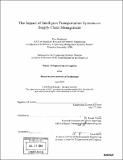The impact of intelligent transportation systems on supply chain management
Author(s)
Beinhaker, Ross, 1978-
DownloadFull printable version (22.38Mb)
Other Contributors
Massachusetts Institute of Technology. Engineering Systems Division.
Advisor
Tomer Toledo.
Terms of use
Metadata
Show full item recordAbstract
Businesses are constantly searching for ways to reduce costs and increase revenue. This is a fact of life in a world where shareholder value drives corporate actions. In order to become more profitable, these businesses develop new processes and techniques to create efficiency. This paper is focused on one particular new technology that can be used to increase corporate profitability--intelligent transportation systems. The primary research objective of this thesis is to determine the impact that differing levels of information can have on transportation practices, and therefore, in turn on corporate profitability. This information is collected, analyzed, and disseminated through the use of intelligent transportation systems. The end result of this work is a quantification of this impact and conclusions related to which informational practices should be implemented into the supply chain. An experimental setup is designed that uses the Los Angeles Highway System as a test-bed. Traffic data is collected on this network over a two-week period. This data is used as the foundation to perform a series of simulations using differing levels of information. Each of these information levels is compared to a baseline to yield a % time savings. Next, a sensitivity analysis is performed by introducing a random error term which is normally distributed with mean zero and a specified standard deviation. The author concludes that there appears to be a fairly consistent trend in the way differing levels of information provide value. Progressing up the information spectrum, it appears that more and more value can be extracted in the form of time savings over the baseline. A monetary framework is examined which translates the time savings derived in the simulations into financial (cont.) performance. It is shown that a regional carrier with a modest fleet size is able to add millions of dollars per year in operating profit by using the highest levels of information in its supply chain practices. After the implementation costs are incorporated into the analysis, the savings from ITS have the potential to unlock significant value for a company. The author recommends that supply chain professionals incorporate intelligent transportation systems into their operations. All in all, the author believes that the pre-trip, predictive information level is likely to offer the most benefit to corporations at a reasonable cost for the near-term if an accurate forecast can be made.
Description
Thesis (M. Eng. in Logistics)--Massachusetts Institute of Technology, Engineering Systems Division, 2004. Includes bibliographical references (leaves 192-195).
Date issued
2004Department
Massachusetts Institute of Technology. Engineering Systems DivisionPublisher
Massachusetts Institute of Technology
Keywords
Engineering Systems Division.